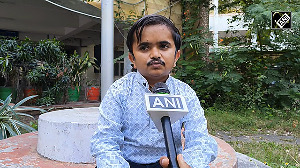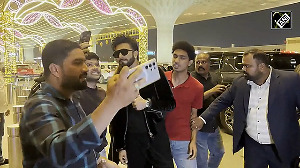India-US relations appear to be increasingly privatised, with little strategic content in it. The hopes raised during the Bush era and the momentum indicated during the Obama visit seem to fade away, at least for the time being, says T P Sreenivasan.
One did not have to be a rocket scientist or an astrologer to predict that 'the Hillary visit will certainly make progress on a number of vital issues of cooperation, the logic of which is beyond question. But an alliance of minds, which is essential to elevate the strategic partnership to a higher level, appears hard to accomplish. A new sense of realism, rather than undue optimism will prevail in India-US relations in the future.' (My Rediff column dated July 18, 2011)
Indeed, the visit took stock of 21 dialogues and workshops in progress and made advances in cyber security, aviation safety and many others, established two regional dialogues on the Middle East and Central Asia and reiterated the legitimacy of Indian interests in Afghanistan, together with those of Pakistan.
Hillary's body language was pleasant and she used words that pleased her hosts, but as for the defining relationship of the twenty-first century and a strong strategic partnership, we have to wait for another day and another set of circumstances.
Neither India nor the US has the political will to deal with the true strategic issues such as nuclear trade, full nuclear cooperation, India's admission to the NSG and MTCR or India's permanent membership of the UN Security Council.
India-US relations appear to be increasingly privatised, with little strategic content in it. The hopes raised during the Bush era and the momentum indicated during the Obama visit seem to fade away, at least for the time being.
One feature that has emerged in India-US relations is the 'frequent flier culture', requiring bureaucrats, scientists and technocrats from both countries to fly up and down to fulfill the agenda. With the benefits of companion tickets thrown in, the direct Air India flights to the US destinations and the US flights to Indian destinations will enjoy a bonanza.
Ironically, this is against global trends in business travelling, in which emails, phone conversations and video-conferencing are fast replacing air travel. In the case of India and the US, movement of people will be taken as forward movement in bilateral issues. Meeting of minds may take place if the two sides meet often enough in summer in Washington and winter in New Delhi.
I was in Vienna when Hillary Clinton put forward her formula to deal with the debilitating Indian nuclear liability law, which stood in the way of the 10 billion dollar nuclear trade the nuclear deal had envisaged.
It took me only a local call to reach a high official in the IAEA to confirm that the IAEA had no role to determine whether any particular national law was in accordance with the Convention on Supplementary Compensation. As a depository of the Convention, the IAEA would merely acknowledge the instrument of ratification. Member States could challenge a national law, but it would be uncivil to do so.
Moreover, India's ratification will not result in coming into force of the Convention, unless big producers of nuclear power like France and Japan come on board. The talks that the US and India had in Vienna must have brought these realities to the surface.
The path shown by Hillary will lead nowhere, unless India is able to change the liability law. The fact that India has nothing to lose by changing the law is totally lost sight of as Bhopal and Fukushima loom large, not the fine print of the law. The US Administration is more or less reconciled to not having nuclear trade with India, though the business lobby is still hopeful of big contracts.
Another 'shadow boxing' in progress is the possibility of India getting enrichment and reprocessing technologies as part of the full civilian nuclear co-operation for which the NSG gave a 'clean' waiver. How 'clean' the waiver was, was a matter of speculation from the start, because it was all too obvious that another test by India would explode the waiver altogether. It was also a fact that there was no explicit commitment on the part of the US or NSG to provide sensitive technology.
What we sought and got were reprocessing facilities where Indian technology would be used. Western technology was not ruled out, but statements even from our side indicated a futuristic possibility rather than a firm commitment.
When Hillary Clinton says that the new decision of the NSG will have no effect on cooperation with India, she means exactly what she says. Excluding non-NPT countries from sensitive nuclear supplies is an article of faith with the NSG and the recent exercise did not envisage any change.
India's admission to the NSG and MTCR is also in the realm of fantasy as of now. When there is talk of 'phased' entry into the four regimes, the intention is to induct India into the Australia Group and the Wassenaar Arrangement, which India could join any time. Our membership of these bodies would not be of great benefit to India. It may even complicate our chemicals trade and transfer of conventional weapons and dual use technology. Progress on the former two regimes should precede any move on our part to go for the latter two. Since NSG was set up to counter India's development of nuclear technology, the logical way is to look at its continuing relevance, rather than find a new role for it!
Obama's intricately worded wish to see India as a permanent member of the UN Security Council is reiterated in the strategic dialogue statement, but no one in New York believes that the US is as yet ready to make any moves in the direction of the President's wish.
The lack of progress on the truly strategic issues should not, however, detract from the exercise and the impressive delegation Hillary Clinton brought with her. India continues as the buzz word in Washington next only to China and every American policy-maker must have a part of the pie.
The true transformation that has taken place after the Obama visit is that the Americans are unabashedly seeking commercial and economic returns from the strategic partnership. Whether it is fight against terrorism, physical security or defence suppies, the American eyes are firmly fixed on investments, creation of jobs and trade. This is reflected in every paragraph of the Joint Statement.
The rise of others is a reality that the US acknowledges, but it is not ready to ignore its long term interests. As expected, expectations have been curtailed and mutuality has been established and that is a sure recipe for fruitful cooperation. No tears should be shed for what cannot be accomplished on this day and time.
T P Sreenivasan is a former ambassador of India to the United Nations, Vienna, and a former Governor for India at the International Atomic Energy Agency, Vienna.
He is currently the Director General, Kerala International Centre, Thiruvananthapuram, and a Member of the National Security Advisory Board.
For more articles by Ambassador TP Sreenivasan, please click here.








